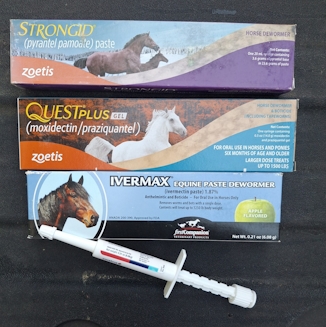Deworming
Deworming and parasite management are an important piece of your horse’s wellbeing and preventative care. High burdens of parasites can commonly lead to unthriftiness, poor haircoat, and poor nutrition management in the adult horse. Young horses and foals can have additional gastrointestinal and respiratory disease caused by parasites.
Fecal Egg Counts (FEC’s) are a diagnostic tool using a fecal sample to determine the amount of parasite eggs that are being shed through the feces of a horse. This is a good tool, especially when this test can be run in-house very shortly after the sample is obtained. It gives a rough number of parasite eggs present, and deworming recommendations can be made based off of those numbers. However, not all parasite eggs are picked up by this test, and this test is primarily for cyathostomes, or small strongyles – the most prevalent parasite in the adult horse. Pinworms, tapeworms, and other miscellaneous parasites like bots, are not going to show up on a FEC.
For most horses, especially those not out on pasture, deworming 1-3 times per year is sufficient. It is incredibly important to not overuse dewormers, as significant resistance has developed, even to the most potent classes of dewormers on the market.
Your veterinarian should help you determine what deworming schedule is appropriate for your horse. Different doses of different dewormers, and different classes of different dewormers are going to target different types of parasites. By strategically using these products, your veterinarian can help you best protect your horse from parasitic disease.
***Please note, foals and horses under the age of 3, as well as horses that have never been dewormed (or have not been dewormed in a very long time) may have different requirements for deworming. Consult your veterinarian to develop a safe and effective deworming protocol for your horse.***
